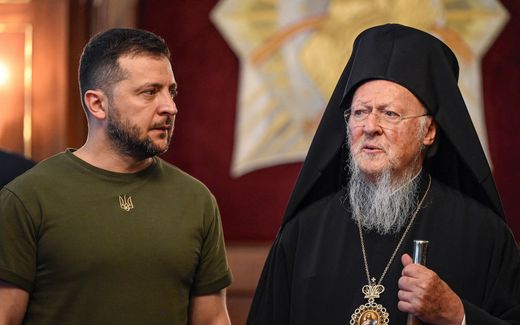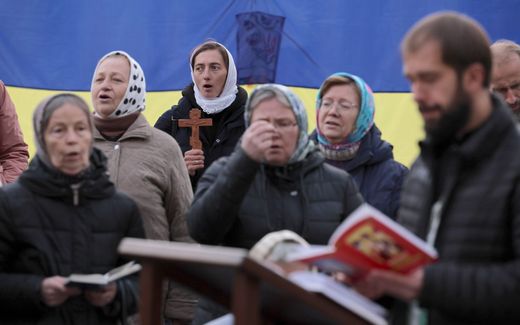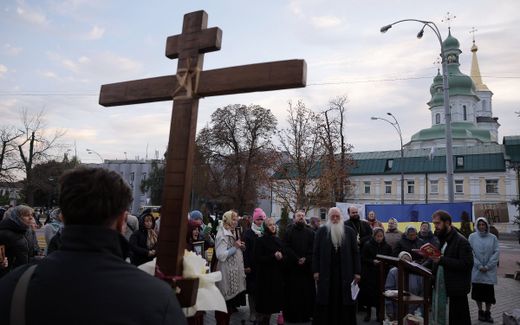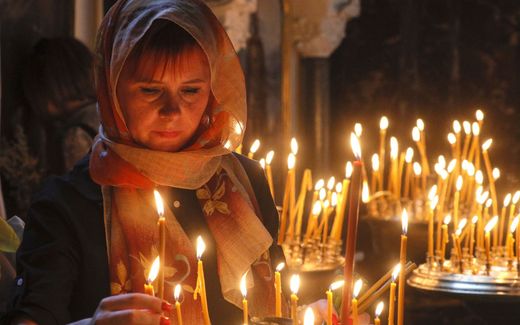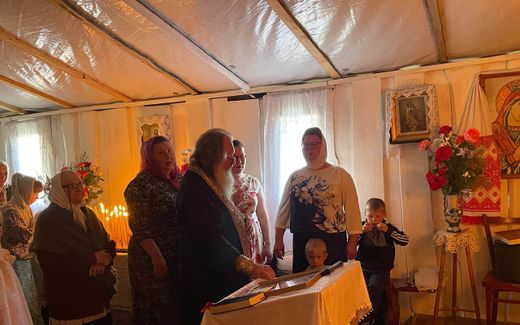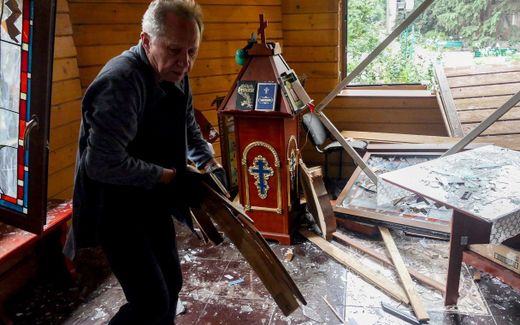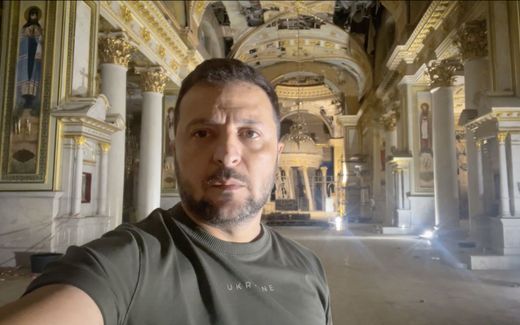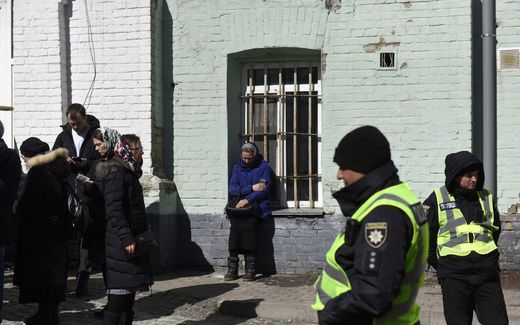Column from Ukraine: Why the Russian Orthodox Church forces Ukraine to take an impossible decision
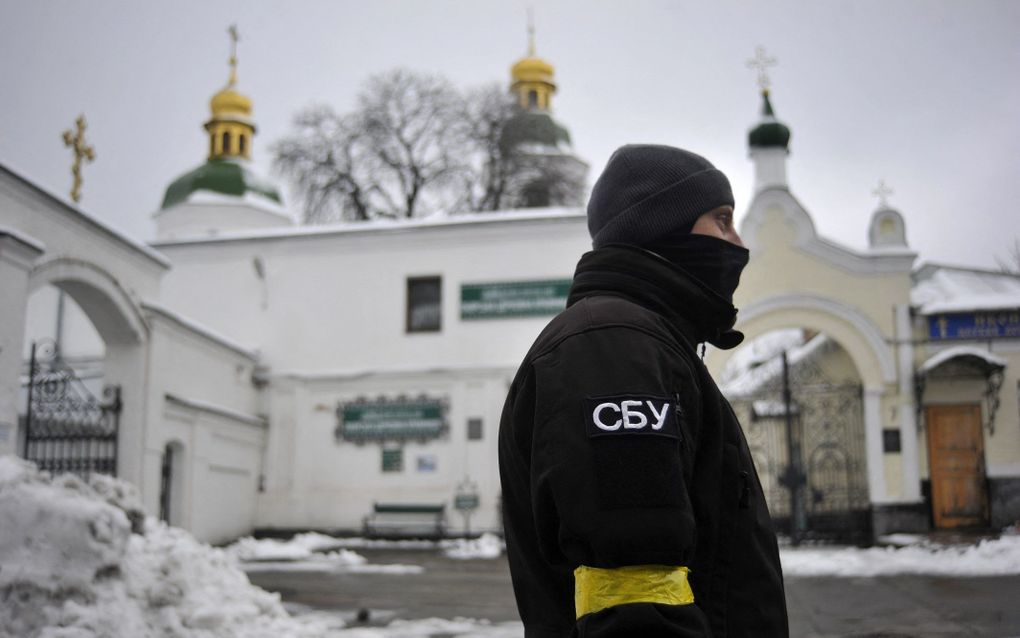
A Ukraine's Security Service (SBU) serviceman stands in front of the entrance of Kyiv Pechersk Lavra monastery in Kyiv, amid the Russian invasion of Ukraine. Ukraine's security service said it carried out a raid on a historic Orthodox monastery in the capital Kyiv over suspected "activities" of Russian agents. Photo AFP, Sergei Chuzavkov
Christian Life
Ukraine has a dilemma. The country must decide about the future of the Ukrainian Orthodox Church, which belongs to the Moscow Patriarchate. Columnist Oleksii Blyzniuk writes that banning it would risk the much-needed foreign support, but keeping it means keeping a pro-Kremlin organisation in the country.
Draft law No. 8371 regarding the activities of religious organisations in Ukraine was developed on December 1, 2022. The document proposes amendments to laws to prevent the "activities of religious organisations whose governing centre is located in a state that carries out armed aggression against Ukraine".
The essence of the law is that the State Service of Ukraine for Ethnopolitics and Freedom of Conscience must conduct a study of the activities of religious organisations to identify connections with a country that is an aggressor against Ukraine. The department then issues a prescription to the organisation to eliminate the violations. If the religious organisation eliminates this connection, it can continue operating in Ukraine; otherwise, the State Service will go to court to stop its activities.
In practice, this means a ban on the Ukrainian Orthodox Church of the Moscow Patriarchate (UOC-MP), which is officially under the authority of Patriarch Kirill, known for his support for the Russian invasion of Ukraine. Informally, this law is even called "the draft law on the ban of the UOC-MP."
Traitor
In January 2023, an examination concluded that the UOC remains part of the Russian Church. The commission showed that there is not just a connection but that the UOC-MP is indeed part of the Russian Orthodox Church (ROC).
Law enforcement has repeatedly caught UOC-MP representatives cooperating with the aggressor country. For example, the Security Service of Ukraine announced suspicion against UOC-MP priest Gennadiy Shkil, who, along with traitor Volodymyr Saldo, called for the annexation of the Kherson region to Russia. There are hundreds, if not thousands, of such cases.
Furthermore, in March of this year, the Moscow Patriarchate officially declared the war in Ukraine "holy." The "World Russian People's Council," headed by the head of the ROC, Patriarch Kirill of Moscow, issued a decree in which the war in Ukraine is called "holy." Furthermore, the document states that "the entire territory of modern Ukraine should fall under the exclusive influence of Russia" after the war ends. This decree was published on the Moscow Patriarchate's website on Wednesday, March 27.
It seems that there are more than enough pieces of evidence that testify against this organisation, and it should simply be shut down in Ukraine. But things are not that easy.
Complex Nuances
On April 9, the Ukrainian ambassador to the United States received an official letter from the U.S. Commission on International Religious Freedom. The document expressed concern about the Ukrainian draft law mentioned earlier. The members of the Commission –read: the U.S. Department of State– were interested int he latest version of the draft law.
According to the Commission, the draft law contains several problematic provisions with negative consequences for freedom of religion or belief. Specifically, it discussed the criteria by which the connection of religious organisations with the ROC is determined. The Commission considered these criteria "overly burdensome" and aimed "against religious communities without requiring evidence of criminal activity."
Another problem the Commission pointed out was that the draft law wants to punish activities that were never criminalised nor will be forbidden after the draft law is adopted. Currently, it allows the state of Ukraine to determine the composition oft he crime manually. This is a problem from both Ukrainian and international law perspectives.
Therefore, the Commission asked Ukraine to refer the draft law to the Venice Commission of the Council of Europe or the UN Special Rapporteur on Freedom of Religion or Belief "to confirm the compliance of the draft law with international law."
Answer
In response, the Ukrainian side prepared a response by the end of April. In short, it stated that, at the time of this correspondence, it was only possible to discuss the government version of the draft law that was adopted in the first reading and had already been published. There are no grounds to answer for all the later amendments prepared by the Committee, the Ukrainian government said.
The initial draft law does not establish criminal or any other sanctions for religious activities. In other words, the Ukrainian side refused to involve the Venice Commission of the Council of Europe or the UN Special Rapporteur, stating that there is nothing wrong with the draft law.
Escalating Situation
In the meantime, the Verkhovna Rada, the Ukrainian Parliament, has not yet managed to vote on the law. The draft law on the ban of the Moscow Patriarchate was submitted to the Rada back in January last year. Deputies supported it in principle in October 2023. Since then, there has been no progression. On July 23, 2024, deputies were supposed to consider the law in the second reading, but this did not happen. After the vote to extend martial law and implement general mobilisation, a number of deputies blocked the rostrum, demanding consideration of the draft law on the ban of the UOC-MP.
However, it ended with the decision at the conciliation council that deputies would go on vacation until August. The deputies of the president's dominant party ("Servant of the People") want to review the draft law again and give their comments. The committee will then consider all comments and submit the draft law for a vote. So, ideally, at the next session after the vacation, the deputies should start with this draft law.
Urgency
Thus, Ukrainian parliamentarians now find themselves in a challenging position regarding religion. On the one hand, they cannot just accept the free existence of a clearly pro-Kremlin organisation on Ukrainian territory that declared a "holy war" on Ukraine. On the other hand, due to the pressing urgency of the problem, Ukrainian politicians do not have enough time or resources to adequately consider all the nuances of this law, which puts religious freedom in Ukraine at risk. In turn, this will have negative consequences for cooperation with both European and American partners.
So, we hope and pray that the Lord will give our parliamentarians not only a good rest at the resorts (during the war) but also wisdom in solving such complex religious issues that can seriously affect Ukraine's further cooperation with international partners.
Related Articles


